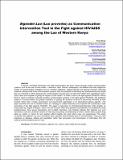| dc.contributor.author | Peres Wenje, Charles Nyambuga, Erick Nyambedha, Catherine Muhoma | |
| dc.date.accessioned | 2020-11-30T06:58:01Z | |
| dc.date.available | 2020-11-30T06:58:01Z | |
| dc.date.issued | 2015 | |
| dc.identifier.uri | https://repository.maseno.ac.ke/handle/123456789/3040 | |
| dc.description.abstract | In Kenya, HIV/AIDS information and skills dissemination has been mainly through modern communication
systems, such as the use of mass media — television, radio, internet, newspapers, and leaflets more than indigenous
modes of communication strategies such as narration (sigendni), singing (wende) and dancing (miende). Mounting
evidence indicates that these communication systems have the potential of alienating and disempowering the people
they are intended to inform because the communication process does not start from within their experiences and in
many cases are incapable of giving full respect to their values. To make a mark in the fight against HIV/AIDS in Africa
there is need to embrace culturally sensitive communication systems in the fight against HIV/AIDS. The traditional
systems of communication put greater emphasis on getting the audience involved in perceiving HIV/AIDS as their
problem rather than a media, government, non government organization or an international agency agenda. This
paper examines the use of narrative fiction as a strategy to create awareness and empower the community to take
ownership of the fight against HIV/AIDS. The paper is grounded on Entertainment-Education (EE) strategy as
propounded by Singhal & Rogers, Papa et al and Fossard. Data were gathered quantitatively and qualitatively using
questionnaires, focus group discussions and in-depth interviews. Key findings indicate that sigendni Luo (Luo
narratives) could be a powerful medium for learning and gaining understanding of others. Stories about people living
either as victims or carers for sick relatives afford insights into what others have not experienced. This article
concludes that sigendni Luo (Luo narratives) were important democratizing tools of communication. They put more
emphasis on dialogue, debate and negotiation rather than persuasion and transmission of information from the
external technical experts point of view. | en_US |
| dc.publisher | THE INTERNATIONAL JOURNAL OF COMMUNICATION AND HEALTH | en_US |
| dc.subject | HIV/AIDS prevention, sigendni Luo, culture, mass media and ora-media | en_US |
| dc.title | Sigendni Luo (Luo proverbs) as Communication Intervention Tool in the Fight against HIV/AIDS among the Luo of Western Kenya | en_US |
| dc.type | Article | en_US |

